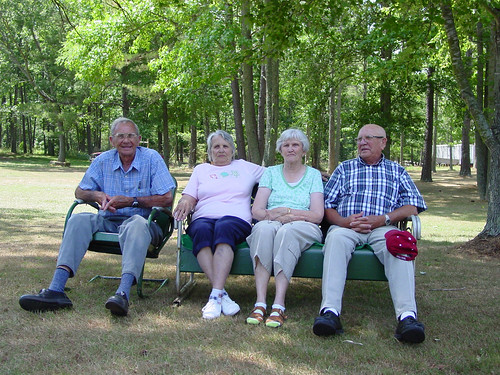30 July 2007
Photo Active IV

Labels: daytona beach, deer, fawn, florida
Photo Active III
The pictures are here, and here's a sample:

Labels: culleoka, tennessee, wedding
Photo Active II
And, I forgot to take my real camera, so had to shoot the pictures using my Palm Treo 650. A sample:

Labels: church, one, room, shady grove, tennessee
Photo Active I

26 July 2007
More SNP Songs
Lowell George, "20 Million Things."
Minutemen, "Political Song for Michael Jackson to Sing."
Todd Rundgren, "Don't You Ever Learn."
Mr. Fripp, "Here Comes the Flood."
Wilco, "Pot Kettle Black."
Yes, "Here Comes the Flood" is really a Peter Gabriel song, and "You Burn Me Up I'm a Cigarette" is really a Darryl Hall song. But the versions I'm thinking about both appeared on Fripp's Exposure.
And, yes, one can argue that the performance and arrangement on "Don't You Ever Learn" are anything but "small." But I think that the underlying song is and that the underlying song comes through the over-arrangement quite nicely, even takes advantage of it. Well, maybe excepting the ride out.
23 July 2007
Smallish Songs, Nearly Perfect
Minutemen, "Corona."
Todd Rundgren, "A Dream Goes on Forever."
Mr. Fripp, "You Burn Me Up I'm a Cigarette."
Wilco, "Heavy Metal Drummer."
20 July 2007
For MKH
15 July 2007
One More
X-04: Straightjacket
X-04: Mr. Retardo (Instrumental)
Labels: instrumental, mister, mr. retardo, retardo, x-04
14 July 2007
SBQotD: 20070714
A grand feast of marinated steaks and jumbo shrimp was winding down, and a group of friends was sitting on the back patio of a Capitol Hill home, sipping red wine. Suddenly, a hooded man slid in through an open gate and put the barrel of a handgun to the head of a 14-year-old guest.
"Give me your money, or I'll start shooting," he demanded, according to D.C. police and witness accounts.
The five other guests, including the girls' parents, froze -- and then one spoke.
"We were just finishing dinner," Cristina "Cha Cha" Rowan, 43, blurted out. "Why don't you have a glass of wine with us?"
The intruder took a sip of their Chateau Malescot St-Exupéry and said, "Damn, that's good wine."
[Read the rest: It ends in a group hug.]
Scenario 2, from this American Scene post
Many months ago, I was going to see John Vanderslice at the Knitting Factory with one of my favorite friends. As it happens, this friend is the kind of woman who gives meaning to the word "striking": she is faultlessly beautiful, and she also has beautiful manners. Naturally you'd expect her to be incredibly intimidating, and she is from a distance. But once you get to talking, you discover the unnerving, tragic truth: apart from being gorgeous, she is also insanely intellectually curious and smart. Worse yet, she's genuinely kind: her generous nature, and her animal instinct for making those around her more comfortable, goes way beyond mere good manners.
So we were walking to the show and got to talking about something weighty and important (negritude?) when a familiar New York character, a drooling schizophrenic, decided to interrupt our conversation.
Panic set in.
[...]
What should I do? Can I defuse this situation artfully, and somehow manage to not mortify my dear friend? I tried. Oh, I tried. And then my friend intervened. She scolded our unwelcome interlocutor. Like a schoolmarm. And it worked. Boy, did it work. It should come as no surprise that she's a very well-regarded high school teacher.
Now for the question, maybe stupid, maybe not. (Hey, it's not daily, so don't get picky all of a sudden.)
Feel free to comment.
Labels: SBQotD
James Madison, 4th President of the United States
- Madison was originally for representation proportional to population in the Senate, as well as in the House. He was opposed to the compromise by which the states got equal votes in the Senate, which, of course, gives voters in Wyoming disproportionate power relative to voters in California. However, he came to embrace the compromise and the Federal system that evolved from it.
The document finally approved was in some ways very different than the plan he had proposed in May. The small states had imposed what Madison persistently regarded as the unjust and impractical principle of state equality in the Senate. The clause empowering Congress to "negative" state laws, long thought by Madison to be the only effective way to prevent state encroachment on national authority, had been dropped in favor of the less explicit supreme-law clause. ...Madison came gradually to see the virtue of this change. An enumeration of the powers to Congress was substituted for the broad power "to legislate in all cases to which the separate States are incompetent." After the decision in favor of state equality in the Senate, Madison more and more approved enumeration as a necessary check on a poorly constructed Congress.
- What one might call Madisonian Republicanism—Aside for a pet peeve: The anti-Federalist faction of Jefferson and Madison that continues today in the form of the Democratic Party came to be called, at the time, Republican. Jefferson, Madison, Monroe, and more all considered themselves Republicans, devoted to republican principles. The "Democratic-Republican" label popular in lists of office holders is an after-the-fact usage designed to distinguish that faction from the contemporary Republican Party, founded before the Civil War in Ripon, Wisconsin. The rate of evolution of the then Republican Party into the Democratic Party will progress in a step-like fashion when we get to the administration of Andrew Jackson. End pet peeve. Where was I? Oh yeah—Madisonian Republicanism is based on the idea that all political power comes from the people. It is assigned by the people to the national government formalized by the Constitution, and it is, in parallel, assigned by the people to the various state governments. In no way was the Constitution as envisioned by Madison, or the national government, a result of the allocation of power by the states to the national government. The power is allocated by the people to both.
- Madison, by serving as Jefferson's Secretary of State, helped deal himself the bad hand he had to play as President. The slowness by which he and Jefferson came to understand the necessity of a strong navy in order to have a chance to stand up to British or French insults meant that when Jefferson left office, the navy that John Adams had gotten built up had largely been let go to rot. Madison showed no willingness to expend political capital to develop the military means of resisting either European power. Madison had to wait until into his term for War Hawk Republicans to be elected (e.g., Henry Clay), almost organically and not by any strength of Madison's leadership, to pass legislation to strengthen the military.
- Madison's main weakness as President has to be seen, in my opinion, as his inability or delay to put the right people into the right positions. Because of a divergence of opinion with Monroe during the end of the Jefferson administration (Monroe was run by some Republicans as an alternative to Madison for President), Madison ended up with a Secretary of State who actually worked against administration efforts. Monroe only assumed the office in 1811, two years into Madison's first administration. He had several ineffective Secretaries of War, not relieving one, Armstrong, until after the burning of Washington, even though it was obvious that the Secretary was not following Madison's directions.
- Madison's second weakness as President was an unwillingness, in general, to lobby Congress to pass laws supporting his policies. The naval example above is just one instance. Likely from his role in the development and ratification of the Constitution he was constrained by his previous statements as to what Presidential power was, how it was to be exercised, etc. So he stayed put, at the White House, certainly socializing with Congressmen and their wives at Dolley Madison's regular events, but not really doing the kind of horse trading required to advance policies. (That approach may last until Jackson: I'm not expecting either Monroe or John Quincy Adams to behave much differently.)
- In reading both Jefferson's and Madison's biographies, you learn who the people were that give their names to so many of the locales in the southeast and other parts of the USA: Albert Gallatin, the Swiss-born financier who was Secretary of the Treasury to both Jefferson and Madison; Alexander Dallas, the Pennsylvania financier, who replaced him; Giles, Lowndes, Grundy, Macon, and Roane all morph from place names to the people those places are named for.
- Madison actually served longer as Rector of the University of Virginia than Jefferson did.
- Madison lived until 1836, dying within a week of the 60th anniversary of the Declaration of Independence. Some wanted for him to take stimulants so he could last until that day, joining Adams and Jefferson (1826) and Monroe (1831) as Presidents who had died on Independence Day.
And now, on to Monroe.
Labels: biography, james monroe, ketcham, monroe, president, ralph ketcham
13 July 2007
More on Republican of the Day
Sorry. I'm not for entrapment or police clampdowns on what is pretty much harmless behavior, personally and socially. It's been going on for years, and society hasn't fallen into the pits, regardless of what some on the right would like us to believe. I'm sorrier that Representative what's-his-name (I've already forgotten, and I like the phrasing better, anyway) would publicly condemn gay people while likely being a closet case than I am that he—or George Michael for that matter—was cruising a park.
The police report doesn't exactly bolster my confidence in the process. It's full of nearly-certain BS, like that the cop went into the bathroom to adjust his police radio instead of to bait someone into following him; and that there weren't any paper towels at the main sink so he had to go into the handicap stall to dry his hands; and that the cops were there doing surveillance regarding a burglary instead of because the spot's known for cruising. When the arrest report is full of likely obfuscations, a stronger benefit of the doubt goes to the alleged perp than usual, even when his gay-rights record is as lousy as whozit's.
Labels: allen, case, closet, gay, gay rights, republican
11 July 2007
Republican of the Day
State Rep. Bob Allen was arrested Wednesday afternoon at a local park after offering to perform a sex act on an undercover officer in exchange for $20, police said.Believe me, if this guy's a homo, I'm all for him. Well, except for the part where he votes or leads people to believe he's going to vote for measures that treat homos as second-class citizens.
Allen, R-Merritt Island, was booked into the Brevard County jail in Sharpes on a charge of solicitation to commit prostitution, a second-degree misdemeanor punishable by up to a year in the county jail and a $500 fine.
He was released a few hours later after posting $500 bail, according to a jail spokesman. The legislator, who was first elected in 2000, could not be reached for comment late Wednesday.
Titusville police were at Veteran's Memorial Park on East Broad Street on a burglary detail when they noticed an unshaven man acting suspicious, going in and out of the restroom three times, said Lt. Todd Hutchinson.
An undercover officer decided to go into one of the bathroom stalls, Hutchinson said. Moments later, Allen knocked on the stall door and offered to perform oral sex on the officer for $20, according to the police spokesman.
The officer identified himself and took Allen into custody. Hutchinson said the officers had no idea the suspect was a state lawmaker.
"After he was arrested, he (Allen) mentioned he was a state legislator," he said.
Allen told a television reporter that what happened was a "misunderstanding." But Hutchinson said the representative did not dispute the undercover officer's version of what happened in the park.
Allen, 48, who chairs the House Committee on Energy, is married and has one child. He also is a former Little League volunteer and has donated time to the Boys & Girls Clubs of Central Florida.
Labels: allen, case, closet, gay, republican
<blank> of the Week
I want to start with a proposal: When they make Die Hard 5: Die Really Hard, and For Real, This Time, which may not happen till far into the future at a point when the studio will have to graft a digital Bruce Willis face onto some poor stunt-shmuck and recreate his voice using a version of Pro Tools so smart that it will eventually control our nuclear weapons systems before turning on us, Skynet-style—when this movie is made, as it (or some variant) surely will be, I want Brad Bird to be the director.As you likely know, Bird directed The Incredibles and Ratatouille.
The American Scene may tend to the right, but the writing is so sweet, and the sensibilities so American that it's easy to forgive the tendency of Reihan and the recently-assembled Ross Douthat-(who is also so wonderfully readable, even with his right-wing capital-C Catholic perspective)-less ensemble there to forgive the tendencies of Bush and his unindicted co-conspirators.
Labels: bird, brad, ratatouille, reihan salam, the american scene, the incredibles
10 July 2007
Kenneth Quinnell: "Why I'm a Democrat"
So I'm a Democrat. That doesn't mean I'm a huge fan of all Democratic politicians and the policies they pursue. Over the years, I've held my nose to vote for a few people I really don't like, policy-wise, and in a few cases in local races, I've voted for Republicans when there were no Democrats in the race or the only Democrats running were criminals. I didn't enjoy it, but I did it. And, as with most progressives, I have no problem complaining about Democrats when I don't like what they do, even Democrats I otherwise like."Join me." I love it. Exactly the right approach. Good job, Ken. We don't always agree on all the details, even though we may share the broad strokes, but I do like your style.
There are a few things that I'm devoted to that some of my fellow progressives aren't. One, is that I'm totally opposed to third party politics. I have no problem with people forming groups or trying to change things, but to me it is totally unrealistic to think you can change the system from the outside or that you can change a party from the outside. Can't be done.
Two, I'm dedicated to winning elections. I think the philosophy out there that some have -- they'd rather vote for the right person and lose, than compromise on some things and win -- makes no sense to me. It never made sense to me, but the Ralph Nader-George W. Bush thing made it clear this way of thinking is a bad idea. [...]
Three, on a related note, is that I can't stand people who dismiss candidates, politicians or allies because of disagreement on a single issue. It's nonsensical and it's doomed to failure. If there is one issue that is particularly important to you, fight for it, but not at the expense of every other issue, because those other things not only affect you, they affect your allies -- the people you have to have fighting with you in order to win on your own issue. Battles are won by coalitions, not soloists.
[...]
The path to changing Florida and changing the world for the better is through the Democratic Party. It's not only a path, it's the only path. Spend all the time you want debating this, discussing it and trying to figure out if I'm wrong or right. Meanwhile, I'll be out there fighting to turn the Democratic Party into the party that I think it can be, the party of the people and the party for positive change for Florida, America and the world. Join me.
What I'd add, is that the Democratic Party became some time betwee the 1930s and 1960s the party devoted consistently to the expansion of the meaning of "All men are created equal" to more and more people. Single-issue politics may be dumb (right on, Kenneth), but getting behind the party with a liberal interpretation of those words from the Declaration of Independence is being on the right side of history, of appreciating at least the possibilities of a positive Americanism, even with its years of slavery, denigration of native rights, etc. We Democrats may not have owned that idea consistently, but in these times, it's ours.
Believe it. Own it. Use it.
Join us.
Happy Birthday, Telstar I

I remember hearing about it on the car radio. I also remember my mom helping my (maybe my brothers'—I would only have been five) Cub Scout den try to make a papier mâché Telstar using a beach ball and lots of crepe paper soaked in something (I don't remember what it was).
I also remember the song. Is it my imagination or did I hear The California Guitar Trio do a cover of that? No wait, it was The Ventures covering "Telstar," and the California Guitar Trio covering "Walk, Don't Run."
Maybe.
08 July 2007
Mack's Skydive
I'm optimistic we'll get more video up soon—maybe old band stuff—but I doubt if any of it will be as interesting as that.
Labels: skydive, video, youtube
Thank You, Come Again

More photos here, at our Flickr site.
Labels: Flickr, kwik-e-mart, photos, simsons
04 July 2007
SBQotD: 20070704
Labels: eurhythmics, missionary man, peter gabriel, SBQotD, sledgehammer
Independence Day, 2007

1. Happy Independence Day!
Let's hear it for a free country.
2. Today, I just made the last EFT to pay off our credit card debt, several months ahead of schedule. I declare Independence from revolting credit. Still have to deal with car- and house-related debt, but that's a little more bearable and sensible.
Let's hear it for freedom from debt.
3. Every 4th of July, my dad used to say, "Today is Independence Day: The day I left my first wife."
Let's hear it for freedom from bad relationships.
4. I have proto-thoughts, have had for a long time, about this whole idea of "self-evident" truths. About these "unalienable rights" being "endowed by their Creator." I'm not trying to provoke an argument about matters of belief, about cosmology: rather, it seems that rights start as ideas, maybe held by one, maybe held by some, and that the expression of those ideas, the eventual putting those ideas down in writing and having them shared by many, creates a context where those rights exist, at least as ideas. But those rights/ideas, without the use of some kind of force—physical, by individuals, by a government based on similar shared rights/ideas—remain just ideas. Not necessarily rooted, maybe not made extant.
At some point, if we advocate our rights, we have to be willing to stand up for them, to fight for them. Otherwise, it's only talk. In a civil society, talk may be a means of fighting for them, but it's probably well advised to keep in mind other means.
Keep your powder dry.
I have little doubt that philosophers have talked this framing out, and that I ought to educate myself about it. I'm open to references, if you care to share.
Let's hear it for freedom. For human rights. For independence.
Labels: 4th of July, debt, freedom, Independence Day, rights
Florida is the New California, Part XXVII
Leaping sturgeon have injured three people on the Suwannee this year, including a woman on a Jet Ski and a girl whose leg was shattered when one of the giant fish jumped aboard her boat. Eight others were hit last year, and with traffic growing on the storied river, sturgeon are joining alligators and hurricanes on the list of things to dread in Florida.The author forgot to include New York Yankees logos. Everywhere.
In what might be evidence of increasing cultural ignorance, no where in the article is the connection between Stephen Foster and the Suwannee River mentioned. Sigh.
Labels: stephen foster, sturgeon, suwannee river
03 July 2007
Transformers Update!
01 July 2007
SBQotD: 20070701
Making a Bridge Sing
 The New York Times currently features this article (registration required, although if you act quietly and quickly and promise not to tell, there may be a copy laying about here) about composer Joseph Bertolozzi's working with the Mid-Hudson (Franklin D. Roosevelt) Bridge near Poughkeepsie, New York,
The New York Times currently features this article (registration required, although if you act quietly and quickly and promise not to tell, there may be a copy laying about here) about composer Joseph Bertolozzi's working with the Mid-Hudson (Franklin D. Roosevelt) Bridge near Poughkeepsie, New York,...to transform the span into an orchestra, compose a piece for it, then actually perform the work live with a small army of percussionists. It is a musical undertaking on a vast scale and one that has brought oddly harmonious marriages among the worlds of art and government, music and engineering.Bertolozzi convinced officials to let him do a demo project using audio samples from the bridge. The result, Bridge Funk, is here for the listening from the composer's space at www.newmusicjukebox.com.
Mr. Bertolozzi, 48, has been meticulously harvesting a multitude of sounds from the structure: not just the cables, which on playback create woo-wooing effects or sounds like a bass guitar, but the spindles below guardrails, the rails themselves, the interior and flanges of innumerable I-beams, connecting metal plates and the grates between walkways.
He sent mounds of steel pellets down the interior of a 315-foot steel tower to create a rain-stick effect. He collected clanks from the “Hudson River Estuary” sign, with its blue sturgeon emblem. An organist as well as a composer, Mr. Bertolozzi even hopes to turn large upright conduits for power lines into rough organ pipes.
“I only play big instruments,” he said.
As one who thumps just about any exposed piece of metal to see how it rings, I am completely delighted by the whole idea of this project. I'm marking Poughkeepsie on my calendar for September 2009.
Along the music and engineering lines, Bertolozzi's notes include this:
The bridge’s designer, Ralph Modjeski, was a highly skilled pianist (he was a classmate of the famous Polish virtuoso Paderewski). He ultimately chose engineering as his profession and became one of the 20th century’s greatest bridge designers. Both as a pioneering engineer and a musician who loved the music of his own time, he would be intrigued to experience this boundary-shattering synthesis involving his beloved bridge and the music of our time.If you want to help the artist complete this work, go here.
(Image from Mr. Bertolozzi's site, © 2006, Spencer Ainsley for The Poughkeepsie Journal, used without permission.)
Labels: bertolozzi, bridge, mid-hudson bridge, music, poughkeepise
